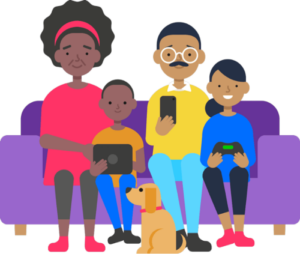What’s on the page
- What is the dark web?
- Why do people use the dark web?
- What are the risks of the dark web to children?
- How is the dark web policed?
- How do I protect my child from the dark web?
- Supporting resources
What is the dark web?
The dark web is a part of the World Wide Web that is only accessible through special software. The most commonly used software is called TOR. It allows users to communicate anonymously on networks without giving out identifying information like personal locations.
What is the deep web?
It is a part of the World Wide Web which is hidden from public view. The contents cannot be accessed by usual search engines. It mainly consists of databases such as web mail and online banking that are hidden behind security protocols. These pages can be accessed directly but require a password to enter. The deep web is different from the dark web.
What is TOR?
TOR, or The Onion Router, is a free and open-sourced software that was originally created by US military researchers to allow an exchange of information completely anonymously. They later released this into the public domain, creating white noise and hiding messages for security purposes. The software is used to conceal users’ identities.
Is it illegal to use the dark web?
Unless you carry out unlawful acts, it is not illegal to use the dark web or TOR.
Why do people use the dark web?
To hide their identity
- People may not wish to have their data collected
- It’s popular with civil liberties groups, journalists and those who support privacy online
- They don’t want to be found (they could be a criminal or looking to engage in criminal activity)
- They want to access dubious content
- They want to use hidden services – although TOR itself isn’t hidden, the sites and users under it are hidden under layers of darknet encryption
For criminal purposes
- Trading in the black market
- Buying illegal products (e.g. weapons/drugs)
- Engaging in forums and media exchanges for paedophiles and terrorists
What are the risks of the dark web for children?
Lack of regulated content and users
- Due to the anonymity of the dark web, it is harder for law enforcement to investigate cases of abuse
Explicit content
- Children can access sites with indecent images, sites selling drugs and/or weapons. However, this is also the case for the surface web.
Online grooming
- Sex offenders are more likely to approach children on the surface web than the dark web
- However, sex offenders tend to use the dark web to meet online and discuss their strategy to take advantage of children
How is the dark web policed?
CEOP – the Child Exploitation and Online Protection Command — which is part of the National Crime Agency, uses the skills of its various experts, including forensic professionals and covert internet investigators, to track illegal activity on the dark web.
CEOP gets over 1,300 reports a month, most of which come from industry groups such as the main internet service providers.
An annual review (2011-2012) showed that over 400 children had been safeguarded as a result of their activity. This also led to 192 suspects being arrested.
What should I do if my child is using the dark web?
Remain calm and gather context
- They haven’t necessarily done anything illegal
- Understand their reasons for accessing the platform
Have an open and honest conversation just as you would for the surface web
- There are risks involved with both and, therefore, it is important to help them think critically about the matter
Recognise the warning signs
- People with bad intentions are good at winning trust and can build on this relationship to pressure your child. Help them recognise who to talk to and what information is safe to share
How do I protect my child from the dark web?
- Review privacy filters across all devices and apps. See our how-to guides to learn how to set these up.
- A Virtual Private Network (VPN) can be used to provide an additional layer of security to your child’s online activity.
- Build their critical thinking: help your child learn how to spot things that may not be what they seem and make smarter choices online. Inform them about the reasons someone using the dark web might want to remain anonymous and how that can cause them harm.
- If your child comes across something that is upsetting or worrying, please report this to the CEOP.






